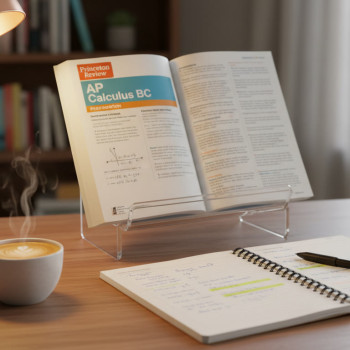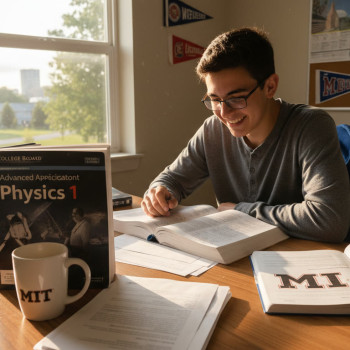Why AP Capstone Matters: Big Picture for Parents
If your teen has signed up for AP Seminar or AP Research — or is thinking about it — congratulations. You’re staring at one of the most formative experiences they can have in high school. AP Capstone isn’t just another line on a transcript. It’s a two-course journey that teaches students how to ask the right questions, plan and execute long-term work, analyze evidence, and present ideas persuasively — the kind of intellectual muscle colleges value and employers notice.
This guide is written for busy parents who want practical clarity, not academic jargon. We’ll walk through what each course looks like, timelines and deliverables, how to support your teen without doing the work for them, real-world examples, common challenges and solutions, and how targeted resources — including personalized tutoring like Sparkl’s 1-on-1 guidance and tailored study plans — can help when your child needs a little extra structure or subject expertise.
What Are AP Seminar and AP Research? A Brief, Parent-Friendly Explanation
AP Seminar: The Foundation
AP Seminar is typically taken first. Think of it as a skills-heavy year where students explore real-world issues through multiple lenses — scientific studies, news reporting, scholarly articles, even visual and statistical data. They learn to synthesize diverse sources, write research-based essays, and present findings individually and as part of a team.
Key student outcomes include:
- Framing a research question from complex issues
- Evaluating credibility of different sources
- Writing concise, evidence-based arguments
- Delivering oral and visual presentations
AP Research: A Yearlong Independent Study
AP Research builds on Seminar. Here your teen chooses a topic they care about, designs a yearlong investigation, and produces a substantial academic paper (usually 4,000–5,000 words) plus a presentation and oral defense. The work mirrors undergraduate research projects in miniature: it requires sustained focus, project planning, data or literature analysis, ethical thinking, and strong writing.
How the Program Is Structured and Assessed
Families often ask: “Is there an exam?” The short answer: AP Seminar has performance tasks and a written end-of-course exam; AP Research is assessed mainly through the research paper, presentation, and oral defense — there’s no traditional end-of-year multiple-choice exam for Research.
Typical milestones parents can expect:
- AP Seminar: team project, individual research-based essay and presentation, and an end-of-course written exam.
- AP Research: proposal and methodology, literature review, data collection or creative product, 4,000–5,000-word academic paper, presentation and oral defense.
Timelines and How to Track Progress
Because both courses are yearlong, planning and pacing are essential. Students succeed when they break the project into manageable phases rather than leaving a semester’s worth of work until the last minute. Here’s a simple timetable parents can use as a conversation guide:
| Phase | Approximate Timing | Student Activities | How Parents Can Help |
|---|---|---|---|
| Exploration and Topic Selection | Weeks 1–6 | Brainstorm topics, read broadly, narrow question | Encourage curiosity; discuss topics; limit screen distractions during focused reading |
| Research Design and Proposal | Weeks 6–12 | Draft proposal, identify methods and sources | Help with scheduling; review timeline; support logistics for interviews or experiments |
| Data Collection / Deep Research | Months 3–7 | Collect data or build product; take notes; synthesize sources | Provide workspace, help arrange access to libraries or experts |
| Writing & Drafting | Months 7–10 | Draft, revise, get feedback from teacher and peers | Read drafts for clarity (not to rewrite); encourage multiple revisions |
| Presentation & Defense Prep | Months 10–12 | Create slides, rehearse oral defense, finalize bibliography | Act as a practice audience; ask friendly but probing questions |
What Good Looks Like: Examples to Ground Expectations
Here are three short, realistic examples of AP Research topics and what an excellent student outcome might be:
- Environmental Science: Investigating how green roofs affect local temperature in the school neighborhood; outcome: a mixed-methods study combining temperature data with interviews of building managers, concluding with design recommendations and a validated dataset.
- History: Analyzing primary sources to trace a local civil rights event’s portrayal in newspapers over time; outcome: a critical historiography that identifies bias, change in framing, and pedagogical implications for local schools.
- Literature and Psychology: Exploring whether reading certain types of literature improves empathy in high school students; outcome: a small quasi-experimental study with pre/post surveys and a thoughtful limitations section.

Common Challenges — and Practical, Parent-Friendly Fixes
Parents often worry when their student seems stressed, procrastinates, or needs specialized help. Here are common stumbling blocks and what works:
1. Overwhelm from Open-Ended Projects
Fix: Break the work into two-week micro-goals. Celebrate completion of the micro-goals. A research project with many moving parts benefits from the same project-management techniques adults use: checklists, mini-deadlines, and calendar blocks.
2. Trouble Narrowing a Topic
Fix: Encourage the question: “If you could answer one specific thing about this topic in the next eight months, what would it be?” Narrowing turns vague curiosity into focused inquiry. A tutor or mentor can help students move from a broad interest to a researchable question quickly.
3. Weak Source Evaluation
Fix: Teach (and model) a simple three-point checklist: author credibility, publication venue, and evidence quality. Have your student read sources aloud and explain why they trust or distrust them. This active practice builds source literacy faster than passive reading.
4. Time Management and Juggling Other Classes
Fix: Integrate the research timeline with their school calendar. Use a shared family calendar for major checkpoints. If the student is balancing sports or jobs, consider targeted tutoring sessions that focus on priority tasks rather than broad brush help — for example, a two-week sprint to finalize a literature review.
Ways Parents Can Help Without Taking Over
It’s a delicate balance: you want to be supportive but not do the intellectual work. Here are practical, hands-on ways to help that stay within appropriate boundaries:
- Be an accountability partner — check in weekly to see what was accomplished and what’s next.
- Offer logistical help — driving to interviews, buying supplies for experiments, or arranging a quiet weekend for focused writing.
- Provide emotional backing — reassure them that revisions are normal and praise incremental progress.
- Read a short draft and ask questions that probe clarity (“What is your one-sentence claim here?”). Don’t edit for them.
How Schools and the College Board Assess AP Capstone Work
Understanding the assessment structure helps parents interpret feedback and coach realistically. Seminar assessment blends classroom performance tasks with a final exam; Research is evaluated mainly through the final academic paper and the oral defense, both of which require clear documentation and a demonstration of the research process.
Teachers and the College Board expect evidence of original thought, rigorous use of sources, ethical research practices, and clear communication. The defense, in particular, is an opportunity for students to articulate their reasoning and respond to questioning — a skill that serves them well in college interviews and classroom discussions alike.
When to Consider Extra Help: Tutoring, Mentors, and Resources
Not every student needs outside help, but targeted support can be a game changer when a project stalls or when students need a subject-matter expert (e.g., statistics, experimental design, or advanced literature review strategies). Consider these triggers for getting extra help:
- The student is two or more weeks behind the timeline and anxiety is rising.
- The project requires specific technical methods (e.g., coding, lab protocols) the student’s classroom doesn’t cover.
- The student needs stronger revision feedback than peers can provide.
Personalized tutoring — such as Sparkl’s 1-on-1 guidance — can offer expert tutors who provide tailored study plans, help with research design, and AI-driven insights to spot gaps in argumentation or structure. When aligned with the student’s teacher feedback, that kind of support helps students refine their work without replacing their agency.
Ethics, Plagiarism, and Originality: What Parents Should Know
AP Research emphasizes ethical research practices. Students must credit sources properly, avoid plagiarism (including over-reliance on AI-generated text without proper attribution), and reveal methods and limitations transparently. Parents can help by reminding teens to save drafts, keep a detailed source log, and use citations for any idea not their own. A note to parents: asking clarifying questions and offering proofreading is fine; rewriting a paragraph for them is not.
Practical Tools and Habits That Help Students Thrive
These simple tools and habits turn abstract advice into daily practice:
- Digital portfolio or shared folder where all research artifacts (notes, drafts, source PDFs) live.
- Weekly 30-minute planning sessions with the student to set work for the next seven days.
- A physical or digital research log that notes source, page, quote, and a one-line summary.
- Regular ‘defense practice’ where parents or peers ask unexpected questions to strengthen thinking on their feet.

How Colleges View AP Capstone
Colleges appreciate AP Capstone because it signals independent inquiry, intellectual curiosity, and the ability to complete a sustained project — qualities that predict college success. A strong AP Research paper can also serve as a writing sample for applications or interviews, especially when a student chooses a topic closely tied to intended majors or extracurricular passions.
That said, admissions processes are holistic. AP Capstone is powerful evidence of skill but one of many elements — GPA, recommendation letters, extracurricular depth, and essays also matter. Encourage your student to think of Capstone as an opportunity to show depth rather than a guaranteed shortcut to admission.
Realistic Expectations for Grades, Scores, and Awards
AP Capstone awards recognize achievement: students who earn qualifying scores on AP Seminar and AP Research — and on four additional AP exams — may qualify for the AP Capstone Diploma. Even without the full diploma, success in Seminar and Research reflects substantial preparation for college-level work.
Families should focus less on a single numeric score and more on the quality of the final research — the clarity of the question, the rigor of the methods, and the honesty of the limitations section. Those are the things that both college faculty and future employers notice.
Final Checklist for Parents: Questions to Ask and Actions to Take
Use this checklist to keep conversations constructive and to support independence:
- Have they chosen a research question that’s specific and feasible within the time frame?
- Is there a clear timeline with two-week milestones?
- Do they have a reliable method for tracking sources and saving drafts?
- Have they practiced an oral defense with someone who asks hard questions?
- Is their teacher satisfied with progress? If not, what help is needed?
- Would targeted tutoring for a short period (e.g., methodology, statistics, editing) accelerate progress?
When Sparkl’s Personalized Tutoring Helps — and What It Looks Like
Families sometimes want to know when tutoring is a good investment. Smart, short-term, tailored support helps when students need:
- Expert guidance on research design or statistics
- Focused coaching on writing structure, transitions, and academic tone
- Regular accountability and milestone-driven plans to beat procrastination
Sparkl’s personalized tutoring offers 1-on-1 guidance, tailored study plans, and expert tutors who can step in for a few weeks to help with a stalled literature review or to coach defense rehearsals. When combined with the teacher’s feedback, this kind of help levels up a student’s work while preserving the student’s ownership of the research.
Parting Thoughts: Your Role as a Parent
AP Capstone is less about getting an “A” and more about learning how to think, plan, and communicate like a scholar. Your role is to create a scaffold: a calm environment, encouragement, logistical help, and occasional accountability. Resist the urge to fix the work. Instead, ask probing questions, celebrate small wins, and bring in targeted help when the project’s technical demands go beyond what your student or their classroom can provide.
In the end, the most lasting benefit of AP Capstone is not college credit — it’s a young person who leaves high school with the confidence to take on sustained, meaningful work. That payoff is worth every supportive conversation and late-night proofreading session you choose to offer.
Resources to Keep Handy
Keep an easy folder (digital or physical) with these essentials: the teacher’s course syllabus and timeline, a synchronized calendar for deadlines, a habit tracker for writing and research sessions, and contact info for any tutors or mentors. When you’re organized, your student can spend more mental energy on the ideas and less on logistics.
Want a Quick Next Step?
Ask your teen to explain their research question to you in one sentence. If they can’t do that, help them work on clarity first — it’s the single best predictor of progress.
And remember: support that emphasizes independence, curiosity, and steady momentum builds not only a strong AP Research paper, but also skills your child will use for a lifetime.

















No Comments
Leave a comment Cancel